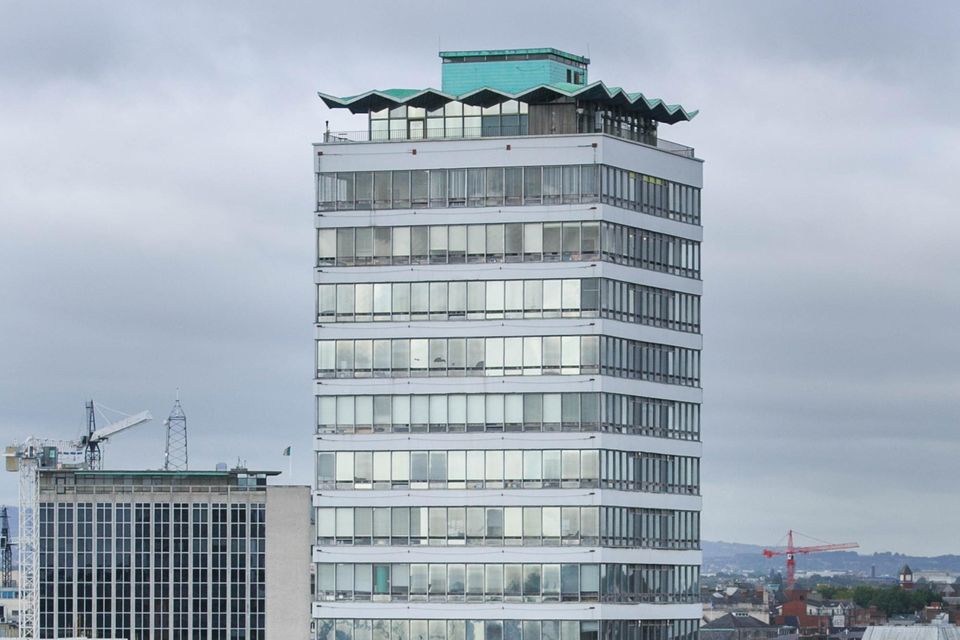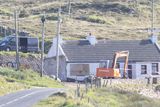‘Summer of discontent’ on the cards: Emergency services face disruption as thousands prepare to take to picket line
Water shortages and boil notices possible with unions fixing dates for strikes
A delivery of 600 picket boards was made to Liberty Hall on Friday. Photo: Gareth Chaney
The threat of a “summer of discontent” looms as thousands of workers prepare for the picket line while living costs remain high.
There have been warnings of water shortages and emergency service disruption as unions fix dates for strikes.
Almost 2,000 firefighters will begin a work to rule on June 6 that could escalate into an all-out strike in a dispute over higher pay.
The following day, 3,000 water service workers start a two-day stoppage.
Water shortages and boil-water notices could be on the cards if the dispute deepens, according to Siptu.
Separately, 1,500 paramedics at the National Ambulance Service have overwhelmingly backed industrial action, although notice has not been served.
A HSE spokesperson said the threat of industrial action was “worrying for our staff and patients”.
Emergency call operators at the Munster Regional Communications Centre, who take 999 calls, will meet today to decide on industrial action in a row over job evaluation.
Pilots at Emerald Airlines, which runs regional flights for Aer Lingus, have voted 83pc in favour of action up to strikes.
A recent bulletin for Siptu members says a “summer of solidarity dawns” as industrial action is considered in several sectors.
“The cost-of-living crisis and the need for the reform of public services has provoked a growing number of industrial actions by Siptu members in response to intransigent management and employers,” it says.
“For local-authority water workers, ambulance paramedics and firefighters, their patience has been pushed past breaking point by a failure of employers to show good faith in collaborating with them to protect working conditions while improving services. In all three areas, industrial action by our members is scheduled to take place during June.”
Read more
It says that elsewhere in the economy a cost-of-living crisis, surge in energy prices and hikes in business costs are leading to pay deals below inflation in most cases, but acceptable to workers. However, some employers are failing to accommodate reasonable claims, it says.
“The issues facing Siptu members currently are common to workers across Europe,” it says.
“In the UK they are coupled with a Tory government which is intent on worsening industrial strife for its own political gain.”
Karan O’Loughlin, Siptu divisional organiser, said 600 picket boards had been delivered to Liberty Hall on Friday.
“It is looking like a summer of discontent,” she said. “We are certainly moving into a period of significant unrest and disruption to emergency services.”
There is a possibility of last-ditch talks or Workplace Relations Commission interventions. Some insiders suggested there is “posturing” going on as different groups vie for attention ahead of talks on a new public-sector pay deal shortly. The current deal ends on December 31.
Summer strike threat: What do workers want?
“Everyone wants a piece of the pie,” said a senior union source. “The cost-of-living crisis is biting down on everyone, and they see a €65bn surplus.”
However, another source denied the disputes are about “throwing shapes” and blamed the Department of Public Expenditure for taking a hard line when it comes to releasing funds.
The water workers are in dispute because they claim their allowances are not guaranteed if they choose not to move to Uisce Éireann under a Government plan.
However, a Department of Housing, Local Government and Heritage spokesperson said staff who decided to stay put “will maintain their current terms and conditions of employment”.
“We hope the matter is resolved quickly and for the parties to engage in dialogue and come to a solution that satisfies all parties,” he said.
In relation to fire services, the spokesperson said substantial progress had been made on the provision of a revised model of retained fire service delivery at recent talks attended by the Local Government Management Agency and Siptu.
“While a positive conclusion to the process to the satisfaction of all parties has not yet been reached, Minister Darragh O’Brien encourages all parties to continue to engage constructively on resolving the outstanding IR issues within the established forum,” he said.
What exactly are workers demanding?
Firefighters
Almost 2,000 part-time firefighters are due to begin industrial action on June 6. This follows a ballot of Siptu members last January. An overwhelming majority backed strike action.
The “retained” firefighters work for local authorities. They claim management has failed “to adequately address a worsening recruitment and retention crisis in the service”.
They claim they cannot take their annual leave due to staff shortages. In addition, their pay has fallen due to a dramatic drop in call-outs, which reduces their income.
Industrial action will start with firefighters restricting their work to only emergency calls. They will not cooperate with training, drills and radio calls through emergency centres. Rolling work stoppages are scheduled from June 13 and an all-out strike from June 20.
Water service workers
Siptu has warned that water shortages and boil-water notices are likely during industrial action because water quality will not be monitored as normal.
It has served notice of industrial action, starting with a two-day strike on June 7 and 8. This will be followed by a “series of industrial actions”.
Stephen Kelly, water worker and chair of the Siptu national negotiating committee, said they had to ensure they would not be at a financial loss if they remained with local authorities as services transfer to Uisce Éireann. The union claims commitments have been given in relation to overtime, but not allowances. A Department of Housing spokesperson claims a commitment has been given that they will retain their terms and conditions.
Paramedics
The HSE says the threat of industrial action by paramedics at the National Ambulance Service (NAS) is worrying for staff and patients. It has called on Siptu to reconsider.
It says the current public-sector pay deal, Building Momentum, means it cannot consider their claims.
The Department of Health has developed a business case with Siptu and Unite and is working to ensure this is included in the next pay talks.
Siptu claims management has failed to implement the recommendations of a report on the reform and modernisation of the service. This was commissioned by the NAS, Siptu and the HSE in 2018. The recommendations include new pay scales and roles.
Pilots at Emerald Air
Members of the Irish Air Line Pilots’ Association (Ialpa) working at Emerald have voted 83pc in favour of industrial action, up to and including strike action.
Ialpa principal officer Owen Kelly said the dispute was due to the failure of the airline to engage with the union on forming a collective labour agreement for pilots. A Fórsa spokesperson said notice of industrial action has not been served on Emerald Airlines. “General meetings with members at Emerald are due to take place this week,” he said. The Irish Independent has contacted Emerald Airlines for a comment.
Nurses
Nurses are threatening a potential winter hospital strike after calling for safe staffing levels to be protected by law. Delegates at the INMO’s annual meeting voted in favour of a ballot for industrial action in mid-September if progress is not made. Health Minister Stephen Donnelly has said that few countries have legislated for safe staffing.













